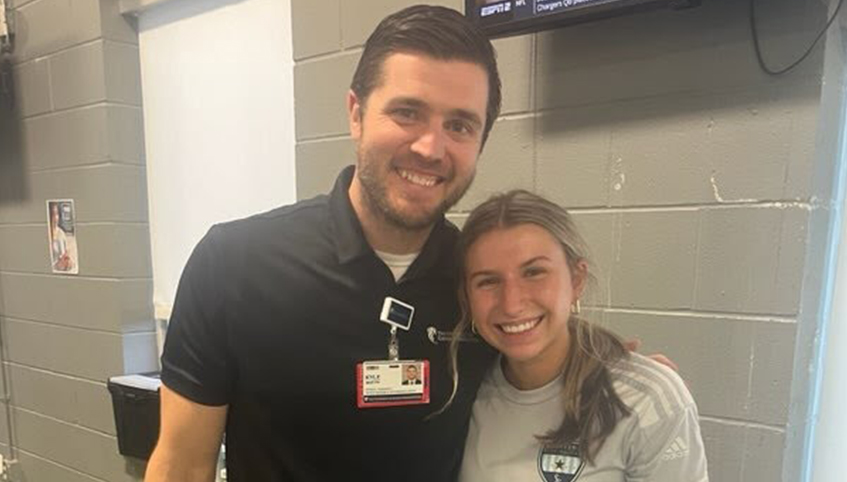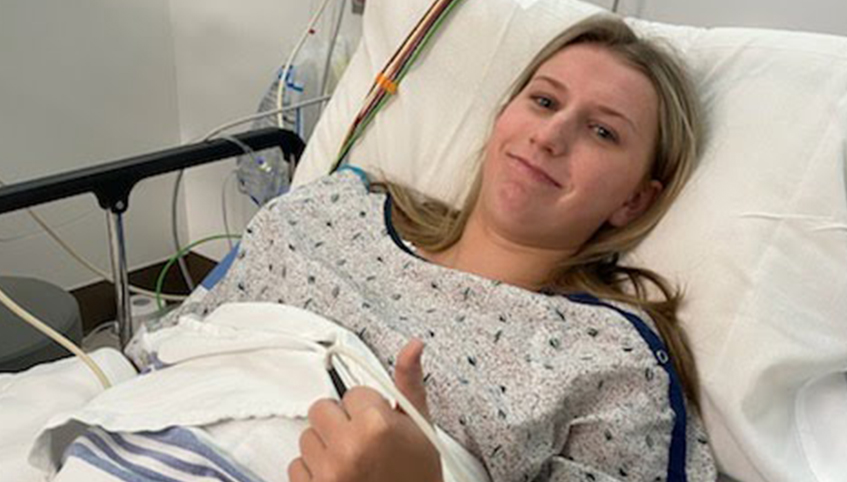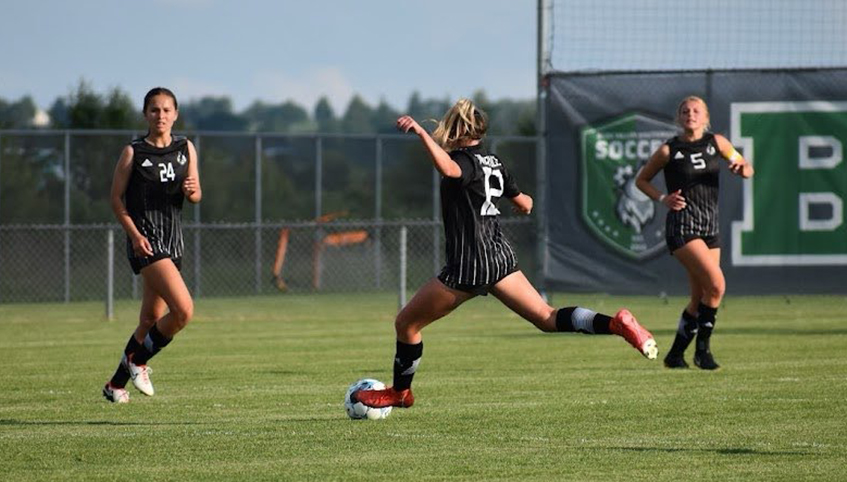December 19, 2024
Recovering from a serious injury is an intense physical process. For Ava Petri, healing an ACL tear meant surgery, physical therapy and months of slowly getting back into training. But her work with the Female Athlete Program had just as much emphasis on mental wellness, resilience and self-identity. Ava says those lessons have stuck with her and made a huge difference in her recovery.
I looked forward to going there because all the personalities and the people were amazing. They made the process not as hard and helped my mental health as much as my physical health." Ava Petri
The dreaded ‘pop'
Ava is an incredibly active senior at Blue Valley Southwest High School. You might find her playing sand volleyball or pickleball with friends, on the pitch training with her club soccer team or hitting shots on the basketball court.
“I’ve been playing soccer all my life,” Ava says.
But she had to take a break from soccer and basketball following an injury in spring 2023.
During a high school soccer game, Ava was crossing a ball and heard a pop as she landed on her foot. Ava says she was in denial and insisted nothing was wrong. But Doug Wiesner, youth sports medicine program director for the Sports Medicine and Performance Center, was filling in for the BVSW athletic trainer and insisted that Ava get it checked out at the health system.
An MRI revealed that Ava’s ACL was torn. Scott Mullen, MD, completed a surgical reconstruction and Ava began physical therapy with Kyle Martin just 2 days later. The orthopedics team also recommended Ava work through her recovery with the Female Athlete Program.
“One of the main things that really helped me was that we all decided to take my time throughout the process and not rush back. I knew I’d be out for around 10 months. I didn’t want to go back any sooner to risk injury,” Ava says. "I immediately started going to PT twice a week and increased to 3 times a week. Going into physical therapy everyone told me I would be miserable, and I’d hate going every day. But in my eyes, my experience was quite the opposite.”
Ava described that she would not only work with Martin but was also seeing sport psychologist Brett Woods, PhD, sports performance dietitian Sara Arnold and nurse practitioner Joni Pro.
“I wasn’t expecting there to be so many people to help me through this. I thought I was just going to PT every day. I looked forward to going there because all the personalities and the people were amazing,” Ava says. “They made the process not as hard and helped my mental health as much as my physical health.”
"We provide a holistic approach when looking at our athletes. With the care from our interdisciplinary team, we can focus on individualized care, looking at all factors contributing to their overall performance," says Pro. "There are a lot of people in an athlete's village that want to help them succeed, but the Female Athlete Program providers offer a different viewpoint outside of their school or club-based sports setting. Athletes have both internal and external pressures surrounding their participation in sport. We are able to look at the larger picture, providing nonjudgemental, individualized guidance to help the athlete meet their potential."

Personal growth
One of the most meaningful parts of the process for Ava was meeting with Dr. Woods. She said she had never talked with a sport psychologist before and wasn’t sure what to expect.
“He talked about short-term and long-term goals throughout my PT experience. We didn’t just focus on sports, which is nice,” Ava says. “He opened my eyes to realize different aspects of my life go into my sports world and how that affects my feelings about getting back into sports. He hit from all aspects of my life to how it will affect me in recovery. He put me in a better place mentally throughout my recovery.”
Dr. Woods says this is common in sport psychology. There’s focus on mental health and well-being but also performance optimization like concentration awareness skills, team dynamics and group communication. It's not just about deficiencies but also about enhancing the athlete’s strengths.
“For a lot of competitive athletes like Ava, when you have a significant injury there's a big question mark around your identity,” Dr. Woods explains. “They put so much time and mental energy effort into this sport and now they don't have access to it. So a lot of our conversations were about finding life balance, finding coping tools for dealing with daily stressors, and being more adaptable and flexible when unexpected things happen.”
Ava said learning this through her rehabilitation and work with Dr. Woods has made a difference in how she views not only herself but her teammates.
“Now when I see other people tearing their ACLs, I treat it differently. I check in on them because I know how lonely it feels. It’s made me more compassionate to people who are going through an injury like this,” says Ava.

Gearing up for the final season
Ava has big goals for her senior soccer season. After being a state semifinalist last year, she has her eyes set on winning a state championship. Then she’s off to college to pursue a degree in architectural engineering.
“Ava was a real hero in her recovery. She used her work ethic, her dedication, and she was responsible. She came numerous times to all these visits, put in the hard work and followed the guidance,” says Pro. “Some of the success stories, and for Ava herself, is that we want them to benefit personally and individually from our programming guidance, because these are tools they'll take with them the rest of their life.”
Ava agrees with that sentiment.
“Coming back to sports, this injury made me stronger and more confident than what I was before,” she says. “I had people complimenting me, and I’d say, ‘It’s the health system.’ They’re like my second family in sports. I even use PT exercises in my workouts now because I believe they made me stronger as a person and a player. I don’t think I’d be returning this way if I went anywhere else.”






